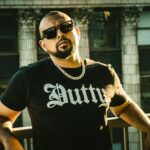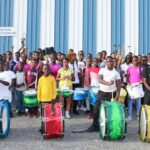Sean Paul recalls the late-night parties of his teens and early 20s that inspired Dutty Rock, his second studio album, which changed everything for modern Jamaican dancehall.
“We wanted to make it as close to what it was growing up, which was house parties in Jamaica,” Paul says. “We just had backyards and mango trees with the moonlight, you know what I mean?”
In reality, many don’t know what he means, which helps explain why the Jamaican icon blew up stateside. Paul transported listeners formerly unfamiliar with dancehall and reggae (beyond a CD copy of Bob Marley’s Legend), into a carefree, colorful world of his own and everyone — from fans and brands, to labels and artists — wanted in on the experience. Still, Paul didn’t create Dutty Rock with an international breakthrough in mind. “I just wanted to write songs that Jamaicans would like,” he says. “I was hungry for [them] to feel what I feel when I hear those tracks, and it reminds me of being on the dance floor getting that first whine.”
It just so happened that millions of music lovers across the globe also wanted to feel what Paul was describing. Dancehall not only penetrated the U.S., but the now-49-year-old hitmaker had the opportunity to tour the world with the euphoric Kingston riddims. Dutty Rock, which celebrates its 20th anniversary this year, boasted some of the highest-charting Billboard Hot 100 dancehall hits of all time, with four singles reaching the top 15 — ”Get Busy,” “Gimme The Light,” “Like Glue” and “I’m Still in Love With You” — and “Get Busy” also becoming the first of his four career No. 1s on the chart. The groundbreaking impact of Dutty Rock was felt over five thousand miles away, leading to a handful of No. 1s in countries including Italy and the Netherlands. Dutty Rock peaked at No. 9 on the Billboard 200, selling over 2.7 million copies in the U.S. alone, according to Luminate (formerly MRC Data).
The album helped cement dancehall in modern commercial music in an unprecedented way, with Paul working with some of the biggest names across genres for decades to come – including The Neptunes, Rihanna, Sia, David Guetta, J Balvin, Dua Lipa, Tego Calderón and Beyoncé, who tabbed Paul to appear on “Baby Boy,” for her debut solo album, Dangerously In Love.
During his Zoom interview with Billboard, Paul also teases a handful of new, buzzworthy features on his upcoming album, Scorcha, coming May 27. “The album is called Scorcha because I’m a hot boy and I’m still fresh and I keep on doing my thing,” he says with a full-bellied laugh. “I put out excellence, I’m not just doing this for a buck. There are times where I need to present an album and get some money from the label. [But] I’m doing this from the perspective of that euphoria that I want you to feel.”
The heavily collaborative album will feature a burgeoning female dancehall artist, a few American pop mainstays, reggaetón favorites and Jamaican legends. The inclusion of Latin music on Scorcha is nothing new for the globally acclaimed rapper, as Jamaican dancehall riddims have long-served as the blueprint for a number of Spanish Caribbean genres, including reggaetón and Dominican dembow, both of which were born out of a sample of Jamaican artist Shabba Ranks’ 1991 track, “Dem Bow.”
But Paul is quick to clarify that even Ranks wasn’t the first to pioneer popular dancehall riddims, naming producers like Steely & Clevie and Sly & Robbie, who helped shape what the genre would become as early as the ‘70s. “I love the fact that reggae and dancehall music come from such a small dot on the planet, and we’re able to give the world vibes that everybody gravitates towards,” he says.
From his childhood, kicking around a soccer ball with friends, Paul was unknowingly preparing to be dancehall’s global ambassador. “I was just always freestyling, always putting rhymes together, thinking of three or four different songs at the same time,” he explains. “All of those things helped me.”
Paul’s first song to make noise in the U.S. was his 1998 track, “Deport Them,” which arrived four years ahead of Dutty Rock. “I remember getting into the car with two DJs after a performance. It was 2:30 AM and we turned the radio on and heard ‘Deport Them.’ They [freaked out],” says Paul, who initially wasn’t quite sure why one radio spin was a big deal. “They were like, ‘Reggae and dancehall don’t play at this time of night on Hot 97, bro.’ And that’s when I started to realize how much more of a star I was becoming, [and my] responsibility to the genre.”
Leaning back in his dimly lit Kingston recording studio, Paul recalls traveling from Jamaica to New York City in the early ‘00s, to perform Patois-based dancehall music for predominantly Spanish-speaking crowds. “When I needed to make a few bucks, I would do shows for a Latin promoter who had like five different clubs. He had a mailing list of 10,000 people, so I got that followership,” he explains. “I did things that were out of the norm for the dancehall community. I wanted to perform for this Latin crowd more. I was like, ‘I think there’s something there. I think they like me a lot.’ Sometimes I was missing out on big shows [in Jamaica] but I saw a bigger picture.”
Paul ponders the question of why it was him who broke through the genre’s ceiling in a way that had never been done before. “Preparedness means opportunities is a cliché thing, but that’s the way it was for me,” he says. The Kingston-born artist says he worked with any and everyone who would put him on a song, which is what led to his widespread popularity. “A lot of people started to look to our genre at that time. Beanie Man was making a lot of noise, I had done songs with him and I started to just get a buzz.”
In 2002, Paul — who was already signed to Caribbean-centric label VP Records for the release of his debut studio album, Stage One — partnered with Atlantic Records ahead of Dutty Rock. Before that album brought Paul some of his career-highs, Stage One was the set that put him on the international map for the first time, featuring “Deport Them” and debuting at No. 2 on the Top Reggae Albums chart.
Soon after Stage One and the cornrows came Dutty Rock. The album’s lead single, “Gimme the Light” became Paul’s first top 10 hit at the end of 2002, with “Get Busy” blasting to No. 1 shortly after. The set brought in a number of nominations and awards, including the Grammy for best reggae album in 2004. It was also given an international reissue in 2003, with a number of additional tracks — including one collab with a particularly noteworthy stateside star, who was on the cusp of her first album as a solo artist.
“I guess ‘Gimme The Light’ was so hot at the time that Beyoncé was like, ‘I want that kid on my album,’” he says of the pop superstar. Paul and Bey first met at a show they both performed at in 1998, when the singer had just released “No, No, No” alongside her original group, Destiny’s Child. Four years later, the singer handed over the Scott Storch-produced single that would become “Baby Boy,” the second single from her solo debut.
“She sent it to me over the internet, and I’m outside my yard in a car underneath a mango tree,” he says. “I’m writing the lyrics and a mango falls straight through the car window into my lap. And I’m like, ‘That’s a hit song right there.’” (He was quickly proven right: The song became Paul’s second Hot 100 No. 1 hit in October of ’03.)
Another one of the album’s biggest hits wasn’t even supposed to be a full song. “I was sitting in my hotel room in Boston smoking and I had this melody that could be a stage transition into ‘Gimme the Light,’” he says. Paul later went to producer Tony “CD” Kelly’s home to record the intro, “Well I don’t really care what people say/ I don’t really watch what dem waan to do/ Still I got to stick to my girls like glue/ And I mon nah play number two…” The intro eventually turned into the single fans now know as the irresistible “Like Glue,” which peaked at No. 13 on the Hot 100.
While artists like Shaggy and Ini Kamoze, who came before Paul, were able to top Billboard charts with their songs, Paul’s wave of dancehall was not just about the music. It became a worldwide cultural movement, filled with unapologetically Jamaican style, visuals, dance moves and traditions. Around the time of Paul’s rise, dancehall legends, including Beanie Man, Elephant Man and Lady Saw were also gaining traction outside of their Caribbean island. Following the release of Dutty Rock, the global spotlight was on Jamaica, with both Beenie and Elephant Man locking in their highest charting Hot 100 singles within the next few years.
Today, there isn’t a single star dancehall artist with the responsibility of representing the entire genre globally, but rather a sound that has cemented its presence across genres, including in the African genre currently experiencing its own moment of international crossover. “I know a lot of reggaetón people have given accolades to the dancehall world, so salute to them, because it’s been symbiotic. Latin music has influenced the English-speaking Caribbean, like samba and rumba and salsa. Even though it wasn’t our mainstream music, it did influence how we approached making riddims,” he explains. “Same with afrobeats. We used African drums in our production forever, but we played them the way we wanted to. And now it’s turning out that a lot of the popular afrobeats songs sound like what dancehall has been.”
Looking to the future of dancehall, Paul, who will embark on his Scorcha U.S. tour in April, speaks with optimism and pride. “Since 2015, more pop-oriented stuff has had a lot of dancehall interjected into it,” he says. “There are a lot more producers, artists and people outside of our country producing dancehall.”
In recent years, massive pop stars have integrated (and often appropriated) dancehall music and culture into their bodies of music – including Justin Bieber, Ed Sheeran and Drake, the latter of whom has been heavily influenced by dancehall, even signing Jamaican artist Popcaan to his OVO Sound label.
“That just proves that one of the biggest artists in the world is infatuated with that sound. This proves how strong of a genre we’ve got,” Paul says of Drake, who was recently compared to Paul after a trip to the hair salon. When it comes to the Toronto rapper’s cornrow moment, Paul says, “I’ve had different words about Drake before, and now I can just say this one is fun. Big up Drake.” (Drake also responded to the uncanny resemblance under a fan-made meme of the “Controlla” singer transposed onto Paul’s Trinity cover art.)
For Paul, the most noteworthy evolution in dancehall over the last two decades is the ever-increasing number of women at the forefront of the genre. Mentioning Shenseea (whose Alpha album release Paul was attending that night), Spice and Koffee, Paul pointed out the male-dominated nature of dancehall – with the exception of a few trailblazers, including Lady Saw, Sister Nancy and Patra. “To see the ladies step forth and get such recognition right now for making good music – for me, that’s a win for the genre, because we need a woman’s perspective. Only a woman can say what she’s going to say in the way she says it. I think that’s one of the most exciting things happening in dancehall right now.”
The now-father-of-two straightens the two beaded necklaces around his collar through black-out shades. He looks the part of dancehall legend, but with a few new (adorable) responsibilities. “Today is my day to pick up the kids,” he says, in between topics. Since the release of Dutty Rock two decades ago, much has changed in Paul’s life: He and his longtime wife Jodi Henriques – who is famously mentioned in the opening lines of “Get Busy,” and who he says he owes a portion of his career to (“My son was born in Canada and two days later, I was out to do a show in New York; if it wasn’t for Jodi, I wouldn’t have been able to keep this up”) – reside in Jamaica with their two children, Levi and Remi. And while his days now include pickups, drop offs and Safari-themed birthday parties, Paul still manages to churn out pulsating dancehall riddims for the world to enjoy.
“Even if I’m not an artist — if I’m just a Jamaican kid — I feel great knowing there are other people who adore our music and try to reproduce it,” he says, now en route to pick up daughter Remi from school. “And as for why it was me and why it’s still been me all of these 20 years, I just got to give thanks to God and the fans.”
Source: billboard





